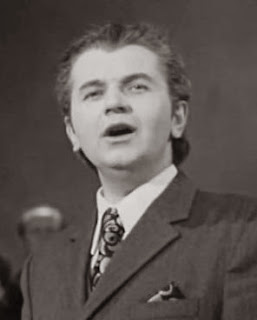Denis
Korolev (1938)
Born on October 24th in Moscow.
Dramatic tenor. Acclaimed Artist of the Russian Soviet Federative Socialist Republic (1976).
In 1958 enrolled to Moscow’s conservatory Vocal department (class
of G.I.Titz), finishing his studies in 1965.
In 1964, during his fifth year of studies, he
was accepted as a soloist in Stanislavski and Nemerovich-Danchenko Moscow
Musical Theater.
In 1964 he also performed in his first role on
the stage of the Bolshoi Theater as Lensky, with his partner being the famous
baritone Georg Ots. Lensky later became his crown role.
In 1965 he became a trainee, and then a soloist
of the Bolshoi, performing there in 1965-86.
Among his roles: Almaviva, Yorodiviy, Berendey,
Indian Guest, Mozart, Alfred, Duke, Manilov ("Dead Souls"), Lykov (War
and Peace", Sergei Prokofiev).
Also gave concerts.
Traveled through USSR
and abroad: to East-Germany, West-Germany, Austria, Bulgaria,
Romania, Poland. Gave a
great performance during the Bolshoi tour to USA in 1975 in the roles of Lensky, Yurodiviy, The
Marquis (“The Gambler”, Sergei Prokofiev), and Anatoliy Kuragin (“War and Peace”,
Sergei Prokofiev). “The New York Post” review stated that a tenor like him
would be an asset to any Opera Theater in the world and that in the role of
Lensky he was immensely attractive – with his beautiful looks, great voice, an
intricate interpretation of the role and his lyricism. “The New York Times” said
that in the role of Lensky Korolev shows an attractive beautiful tenor voice
which is used with expressiveness and emotionality. “Daily News” wrote that the
high, beautiful, powerful lyric tenor of Korolev is ideal for the role of
Lensky, and one would need to go back to the recordings of Ivan Kozlovskiy to
find a comparable performance.
Laureate of International Radio Corporations
Competition in Munich (1-st prize, 1966),
International Competition of Appearing Musicians in Vienna (2-nd prize, 1967).
In 1986-2000 taught in Moscow conservatory.
